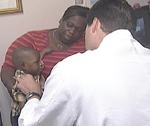New children’s airway clinic aims to
treat, educate
Coming
into the world wasn’t easy for Taron Mellerson, who was born 11
months ago after just 23 weeks of gestation. Now, he suffers from a
complicated condition called subglottic stenosis that makes breathing
difficult. The disease could cause him to aspirate and develop
pneumonia.It simply means his airway is too small, making it hard for him to breathe and eat.
MUSC's new Airway and Aspiration Center for Children (AACC) will specialize in conditions such as subglottic stenosis and dysphagia, a swallowing disorder that afflicts an estimated 15 million people.
 Dr. David White
examines Taron while in mother Taronda Gaillard's arms.
Dr. David White
examines Taron while in mother Taronda Gaillard's arms.For children, the health risks of dysphagia and similar conditions increase significantly, even causing fatal conditions. According to the Journal of Neuroengineering and Rehabilitation, 94 percent of children with dysphagia will experience aspiration, a condition that allows foreign material to enter the airway. This can result in malnutrition, dehydration and chronic lung disease which can lead to pneumonia.
At MUSC’s Children’s Hospital, world leaders in pediatric airway and swallowing disorders have joined to launch a treatment facility unique to the Southeast. Dysphagia and subglottis stenosis are two of many conditions doctors in the AACC have begun treating since the center opened Oct. 6.
Taron was the first patient to be seen by the clinic and its director, David R. White, M.D., who has followed the child prior to opening the clinic. His mother, Taronda Gaillard, drives more than an hour from Vance to make the appointment.
For children with conditions such as Taron’s, the center will provide the highest quality and most comprehensive care for children while, at the same time, offering well rounded, multidisciplinary education for parents and families.
MUSC’s AACC will generate new treatment methods, educational experiences and collaborative research opportunities through the Children’s Hospital and White's expertise.
AACC focuses on the study and treatment of children with complex aerodigestive problems, including chronic tracheostomy dependence; airway abnormalities, such as tumors; complex chronic cough; and aspiration. Because pediatric airway and swallowing disorders involve a number of complex and often life-threatening clinical implications, successful treatment involves collaboration between a number of subspecialties, such as pediatric surgery, plastic surgery, genetics and pediatric neurology. AACC will be unique in that it will provide the ability for researchers and clinicians to coordinate subspecialty care for children with airway and swallowing problems that allow comprehensive care during a single visit.
The team includes White; Lucinda A. Halstead, M.D.; C. Michael Bowman, M.D., Ph.D.; R. Bhanu Pillai, M.D.; Bonnie Martin-Harris, PhD.; and Elizabeth Stokes.
Friday, Oct. 27, 2006
Catalyst Online is published weekly,
updated
as needed and improved from time to time by the MUSC Office of Public
Relations
for the faculty, employees and students of the Medical University of
South
Carolina. Catalyst Online editor, Kim Draughn, can be reached at
792-4107
or by email, catalyst@musc.edu. Editorial copy can be submitted to
Catalyst
Online and to The Catalyst in print by fax, 792-6723, or by email to
catalyst@musc.edu. To place an ad in The Catalyst hardcopy, call Island
Publications at 849-1778, ext. 201.